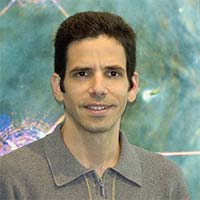Meet the IBEX Team: José Francisco Salgado

Dr. José Francisco Salgado loves astronomy, graphic arts, technology, and learning about cutting edge science. He uses all these skills in his role as co-webmaster of the IBEX web site, which launched in June 2005.
"The best part of my job is combining astronomy education and computer technology," José Francisco said. "One of the things I enjoy the most is designing and creating astronomy education graphics for teaching astronomy. Some of these graphics end up in astronomy books and on the web as well as in my lectures and courses."
Working on the IBEX web site is a small part of José Francisco's job as an astronomer at the Adler Planetarium & Astronomy Museum in Chicago. At the museum, José Francisco helps the public understand science by teaching courses, explaining astronomical phenomena on English and Spanish language radio and TV, and advising exhibit designers and planetarium show producers on scientific content. He also conducts astronomy research and teaches at a local college.
One of his favorite projects is making astronomy information available to Spanish-speaking people living in the United States. He will also use his Spanish language skills to help with the IBEX mission. As the Education and Public Outreach Partner for the IBEX mission, the Adler Planetarium will create educational resources about the mission for nationwide distribution. These resources include a planetarium show in English and Spanish. José Francisco will oversee the translation of the show.
"I worked as an adviser on an Adler-produced planetarium show, Solar Storms, and it is exciting to be involved with that astronomy topic once again with the IBEX mission," he said.
Growing up in Puerto Rico, José Francisco found his inspiration to become an astronomer in his own home. "One day when I was in third grade, I found a book at home that my father owned about the first man on the moon. It definitely inspired me to learn about space even though the word astronomer was then unknown to me," José Francisco said.
"As a young reader, I was inspired by Carl Sagan and Isaac Asimov books popularizing science. I was also inspired by the beautiful astronomical images published in Sky and Telescope and Astronomy magazines. These days, I get inspired by new discoveries, Hubble images, and by working with very smart colleagues," he said.
His education prepared him for a career in astronomy education. In Puerto Rico, José Francisco attended a bilingual school before studying physics at the University of Puerto Rico in San Juan. Prior to earning his doctorate at the University of Michigan, he spent a year teaching chemistry and physics at the bilingual school he had attended.
He said, "While in graduate school, I learned about and was exposed to education and public outreach. I also then developed my interests in graphic design. This led me to pursue a career as an astronomy educator."
José Francisco's enthusiasm for new technology and astronomical discoveries makes the most challenging part of his job enjoyable. "With a science career, the main challenge is to keep up with both scientific and technological discoveries. This is something that if you don't do, it will become difficult later on to catch-up with. It's a challenge that I actually enjoy. It saddens me when I see professionals using very old technology mainly because they are afraid of learning something new," he said.
New technologies, José Francisco said, have always help scientists make new discoveries about our Universe. "It's very exciting to know that we're being limited by technology to make new discoveries, but that new technologies are continuously being developed to push the boundaries of those limitations. For instance, we inferred the existence of extrasolar planets because their gravitational pull resulted in the wobble of their parent star, but now, we are close to producing images of these worlds," he said.
Although José Francisco is a technology enthusiast, he also sees that the widespread availability of technology has dulled many people's curiosity about the Universe. "It surprises me that so many people don't take the time to look at the sky, and lack an understanding about celestial phenomena such as the phases of the moon, the seasons, or the motion of the sun and stars. Technology makes knowing about these things unnecessary for our daily routines."
He still finds that the low-tech effects of our night sky can inspire most people, once they take the time to wonder about it. "It is very easy to get people engaged in a conversation about astronomy facts they ignore and that is something that I see all the time when teaching introductory astronomy. Initially they ask, 'Why should we study astronomy?' and later the 'Cool, I didn't know that!' comments are very common," he said.
His advice for aspiring astronomers is that "They must do well in math and take as many physics courses as possible because all things in nature have a physics foundation. Also, regardless of what people study, I am a firm believer that people should be as multidisciplinary as possible."
That's good advice from an astronomer/webmaster/translator/graphic artist who spends his free time creating and enjoying photography, music, and art with his wife and daughter!